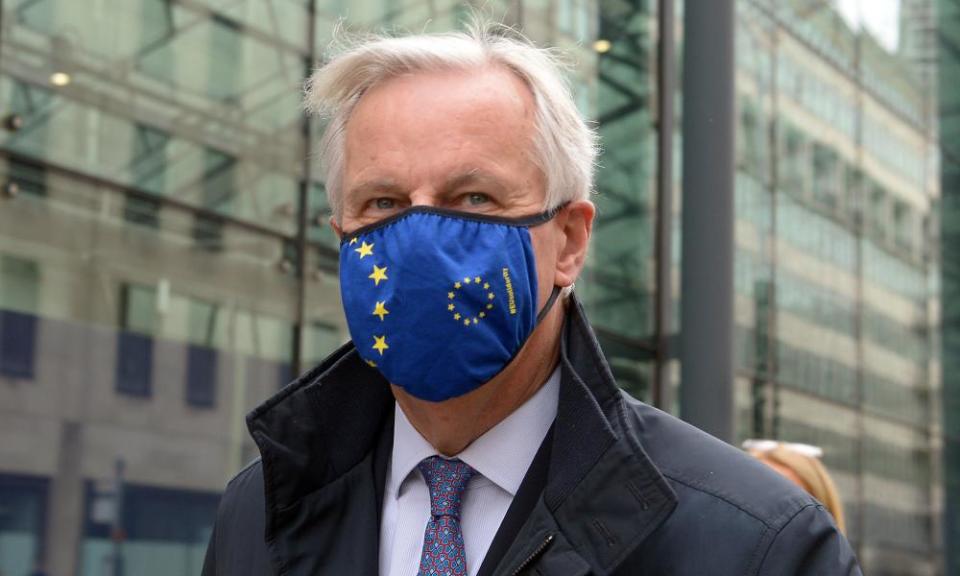Barnier urged not to be intimidated as Brexit talks enter 'final few days'

The French government has urged Michel Barnier not to be intimidated in the Brexit standoff with Downing Street, as Barnier’s British counterpart hinted at pressure on him to end the talks.
During a briefing on Friday, the EU’s chief negotiator advised ambassadors that he would resume the negotiations in London, despite his threat to pull out earlier in the week.
“But he was clear that things are entirely stuck,” said an EU source. Barnier’s travel plans appeared to be “driven more by a wish at the highest levels of the European commission to negotiate until the bitter end than actual progress on the ground”, the source added.
In turn, David Frost, who is leading the UK’s negotiating team, offered his own downbeat assessment in a statement on social media, as both sides sought to extract a final deal-making concession.
“Some people are asking me why we are still talking,” Frost tweeted. “My answer is that it’s my job to do my utmost to see if the conditions for a deal exist. It is late, but a deal is still possible, and I will continue to talk until it’s clear that it isn’t.”
Boris Johnson later claimed in a television interview that the “likelihood of a deal is very much determined by our friends and partners in the EU”.
With the two sides engaged in what amounts to a prolonged blinking match, Clément Beaune, France’s European affairs minister and a close ally of the president, Emmanuel Macron, said the EU must stay resolute in the face of British brinkmanship.
“We can’t yet say that we have an agreement, and I don’t know if we will have one,” he said. “I think it is possible and obviously preferable for us, and even more so for the UK.
“We must not be intimidated. Of course, this negotiation is difficult. The British need a deal more than we do. The Europeans must be convinced of this, and convinced of their strength in this negotiation. This is the best way to defend our interests and our priorities.”
Barnier had told Frost on Tuesday via video conference that he could not see any point in coming to London unless the UK moved towards the EU’s positions.
Despite a lack of substantive progress since, he still opted to avoid a major crisis in the negotiations by confirming he would travel to London on Friday evening to reopen the face-to-face talks. Barnier has been in quarantine since last Thursday after one of his team tested positive for coronavirus.
Beaune said the negotiations were in the last “few days” and the European commission should not weaken in the face of Johnson’s calls for compromise.
He said: “Let us not forget that we are a market eight times the size of the UK market. It is not a question of lack of respect or aggressiveness or arrogance on the part of Europeans, but we always tend to do the opposite. That is to say, to believe that we are weak, that we must make gestures and find compromises or accommodation.”
During his briefing, Barnier echoed the warning made by the European commission president, Ursula von der Leyen, earlier in the week, saying he could not be confident that Downing Street would compromise sufficiently for a deal to be possible.
A senior EU diplomat said: “Without London taking the necessary decisions quickly, reaching a deal will be all but impossible. Time is running out quickly. There are only a few days left for further negotiations.”
The negotiation remains stuck on the level of access that will be granted to European fishing fleets in UK waters and the means by which either side will be able to hit back if the other seeks to gain a competitive advantage by diverging on environmental, labour or social standards.
The transition period, during which the UK has remained in the single market and customs union, will end in 35 days.
It is understood that during a meeting of MEPs on Thursday it was agreed that it would be very difficult for the European parliament to scrutinise and give its consent for a deal unless it was reached by next Wednesday. An extraordinary sitting of the parliament has been pencilled in for 28 December.

 Yahoo Finance
Yahoo Finance 